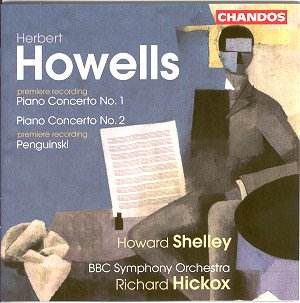HERBERT HOWELLS
Piano Concerto No.1 in C minor Op.4
Piano Concerto No.2 in C major Op.39
Penguinski
 Howard Shelley, piano
Howard Shelley, piano
BBC Symphony Orchestra/Richard Hickox
 CHANDOS CHAN
9874
CHANDOS CHAN
9874
Crotchet

Herbert Howells is generally best-remembered for his organ works and his
choral music which includes some large-scale choral/orchestral pieces. One
tends to forget that quite a number of his early works were either instrumental
or orchestral ones.
CHANDOS's earlier releases (Orchestral Works Volume 1:
CHAN
9410 Volume 2:
CHAN
9557) together with the present disc help put things straight again and
make one regret that, for whatever reasons, Howells did not write any purely
orchestral music after about 1940. (Incidentally Music for a Prince of 1948
is just a reworking of two movements from the early suite The Bs.)
Howells' three big orchestral works - if one excepts the magnificent
Concerto for Strings - are concertante pieces: the two piano concertos
and the masterly and long-forgotten Fantasia for cello & orchestra.
Moreover the First Piano Concerto was completed in 1913 when Howells was
still at the RCM. Stanford conducted its first - and possibly last - performance
with Arthur Benjamin as soloist in 1914 at the Queen's Hall. Ivor Gurney
obviously loved the piece and longed to hear it again. He was never to do
so. The First Piano Concerto is a most ambitious piece lasting over half
an hour cast in the grand romantic mould with a lengthy first movement including
an extensive cadenza, a long meditative slow movement and a more animated
finale. One might be forgiven for hearing echoes from Rachmaninov, Schumann
or Brahms in this youthful work which already displays a remarkable orchestral
flair and assurance in its handling of long paragraphs. Quite an achievement
for a composer still in his early twenties.
The score of the First Piano Concerto used for the present recording was
prepared by John Rutter who completed the missing final bars and to correct
some errors in the parts and score.
The Second Piano Concerto, of which this is the second recording (Hyperion
CDA66610),
shows a considerable advance on No. 1. By now Howells had found his way into
music and was fully master of his trade. He devised his Second Piano Concerto
in the grand romantic manner although this now clearly Howells' throughout.
The first performance was not altogether a success. The soloist, Harold Samuel,
disliked it and the conductor, Malcolm Sargent, was not particularly fond
of it. This disastrous premiere came as a blow to Howells and probably caused
him to cease writing orchestral music.
Howells described this Concerto as having "deliberate tunes all the way"
and "being jolly in feeling, and attempting to get to the point as quickly
as may be". Of course, with Howells, things are not always as simple as that.
The music of the concerto has many Howells fingerprints but the accusation
of "modernism" heard at the time of the first performance does not hold if
put into the context of the present times.
This bright, brilliant and dynamic piece may now be enjoyed for what it is
- a beautifully crafted, colourful work likely to appeal to audiences that
enjoy, say, Ireland's Piano Concerto or Prokofiev's Third Piano Concerto.
There is not much to choose between the present performance and that by Kathryn
Stott with the Royal Liverpool Philharmonic Orchestra conducted by Vernon
Handley (HYPERION CDA 66610 ). Hickox tends to favour somewhat slower tempi
in the first two movements while he makes the Finale really joyful.
Stravinsky's Petrushka was a lasting influence on Howells' orchestral
music which often has some sort of concertante piano part. Clearly
Penguinski is yet another homage to Stravinsky (even in its title!).
This short ballet is a delightful trifle well worth hearing. It is a fine
example of Howells at his most extravert. It was written for a visit made
by the then Prince of Wales to the RCM. Incidentally Paul Spicer in his excellent
insert notes mentions 1933 as the date of this visit whereas Christopher
Palmer (in "Herbert Howells: A Celebration" Thames 1996 2nd edition) mentions
1929. Can anyone shed any light on this small documentary point?
Howard Shelley plays with assurance and affection, and receives a superb
support from the BBC Symphony Orchestra conducted by Richard Hickox. So I
do not hesitate in recommending this most welcome addition to Howells' steadily
expanding discography, mainly thanks to enterprising record companies such
as CHANDOS and HYPERION. I hope there will soon be a fourth volume.
Hubert CULOT
A belated response to a question posed
by Hubert Culot in his review of the disc including the brief ballet
'Penguinski' by Herbert Howells. Hubert asks about the discrepancy in
dating this work between Paul Spicer's booklet note (1933) and Christopher
Palmer's book 'Herbert Howells: a celebration' (1929). Spicer is correct.
I compiled the works list for Christopher's book as an ofshoot of a
long and ongoing project to document Howells' music. Penguinski is one
of several works by Howells about which there has been some confusion,
a situation often exacerbated by the innacuracy of the composer's own
memory in his old age. We took the date from an earlier source, based
on a conversation with Howells himself. At the time all that existed
of the piece was an undated and incomplete sketch. We knew that it had
been written for a specific occasion at the Royal College of Music,
but the actual date of that concert was not unearthed until after the
publication of Christoper's book. Later still, a complete and intact
set of parts was uncovered - presumably those from the first and only
performance - and this formed the basis of the score that was made up
for the Hickox recording. Needless to say there were discrepancies between
the parts and the sketch, but we took the parts to represent Howells'
last thoughts on the matter.
Paul Andrews
p.d.andrews@btinternet.com

